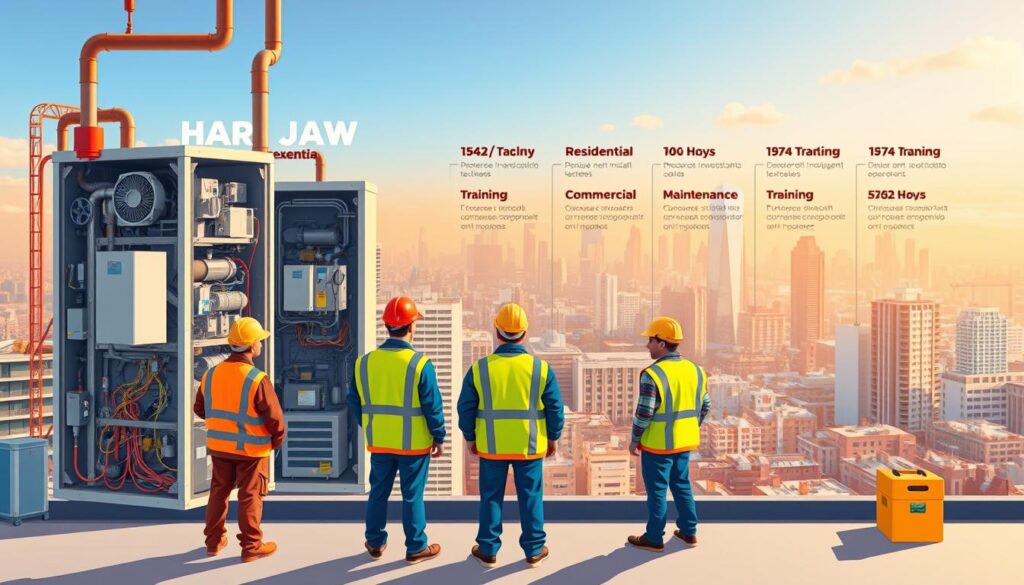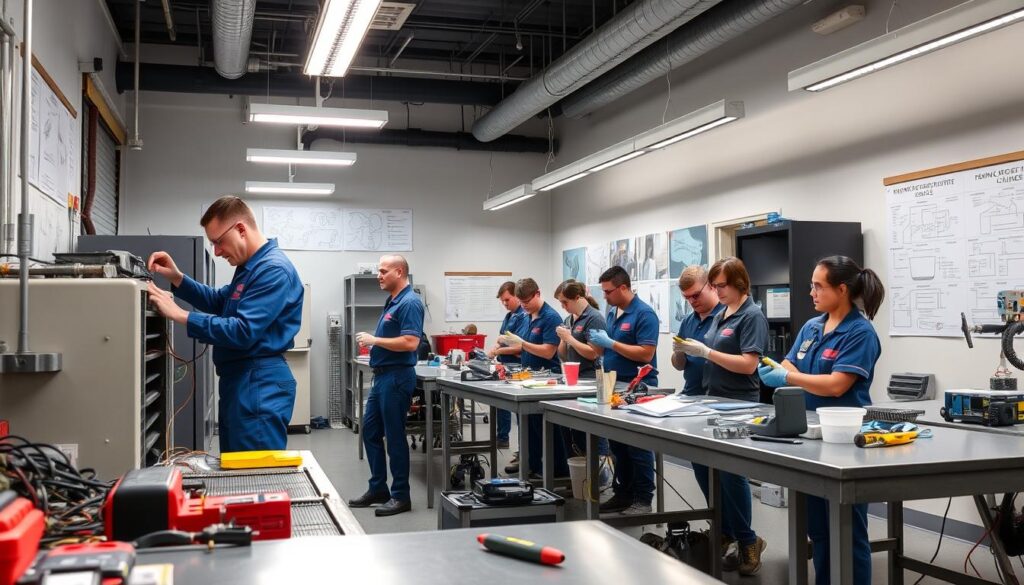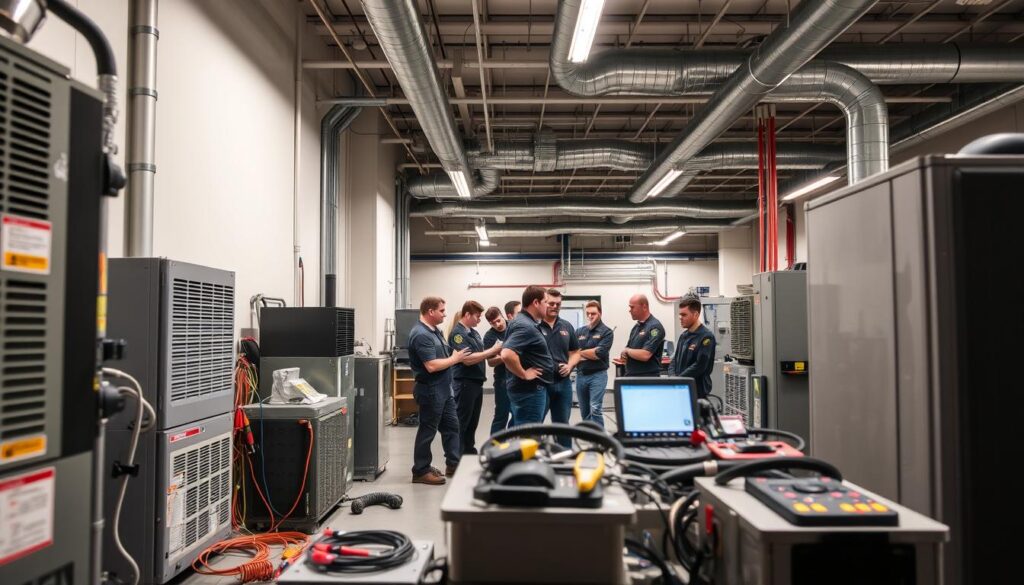Affiliate Disclosure
HVAC Guide Guys is a participant in the Amazon Services LLC Associates Program, an affiliate advertising program designed to provide a means for sites to earn advertising fees by advertising and linking to Amazon.
How Long HVAC Training? Are you curious about how fast you can start a rewarding HVAC career? You might be surprised at how quickly you can begin earning a good salary.

The time it takes to become an HVAC technician varies. Some programs last just 6 months, while others take 2-4 years. Your choice of program and how much you commit will affect your training time.
There are many ways to enter the HVAC field. You can pick from quick certificate programs or more detailed associate and bachelor’s degrees. The industry offers flexible training options to fit your goals and schedule.
Key Takeaways
- HVAC training can range from 6 months to 4 years
- Certificate programs offer the fastest entry into the field
- Hands-on experience is key for success
- Many educational paths are available
- The average HVAC technician salary is $59,620 in 2023
Table of Contents
Understanding the HVAC Career Path and Training Options
Starting a career as an HVAC technician is exciting. It leads to a dynamic and vital field. You’ll learn about different training paths and career options. The time it takes to become an HVAC technician varies by path.
Different Routes to Becoming an HVAC Technician
There are several ways to begin your HVAC career. Each path has its own benefits:
- Trade School Programs: Usually takes 10 months to finish
- Apprenticeship Routes: Takes 3-5 years of learning
- On-the-Job Training: Gets you hands-on experience
Educational Prerequisites and Requirements
Most HVAC training lasts from a few months to a couple of years. You need a high school diploma or GED to start. Technical programs teach you about installing, maintaining, and fixing systems.
Career Growth Opportunities
The HVAC field offers great chances for career growth. Entry-level technicians start at about $23.43 an hour. They can move up:
- Entry-level jobs: HVAC Apprentice, Helper
- Mid-level roles: Service Technician
- Senior positions: HVAC Contractor, Instructor
With more experience, you can become a refrigeration specialist or a green tech expert. You could even earn up to $131,822 a year as a systems design engineer.
Explore Our HVAC Shop
Looking for top-rated HVAC tools, parts, and accessories? Visit our shop and find the perfect solution for your needs.
Visit the ShopHow Long HVAC Training Takes: Program Duration Overview
Knowing how long HVAC training takes is key for those eyeing a career in this field. The time needed for HVAC certification varies based on your path and goals. Most programs last from 6 months to 2 years, with options for those who want to start sooner.
Your HVAC training can follow different paths:
- Certificate Programs: Usually 6-12 months long
- Associate Degree Programs: Typically 18-24 months
- Accelerated Training Options: Can be finished in 18 months
The length of your HVAC education depends on several factors:
- Program intensity
- Whether you study full-time or part-time
- The focus of your curriculum
- Any extra certifications you need
Many students finish their HVAC training with just a high school diploma and some technical classes. Some programs mix online learning with hands-on lab work. This can change how long it takes to get certified.
While the training time is important, the real benefit is the skills and knowledge you gain. These are essential for a successful HVAC career.
Explore Our HVAC Shop
Looking for top-rated HVAC tools, parts, and accessories? Visit our shop and find the perfect solution for your needs.
Visit the ShopTypes of HVAC Educational Programs Available
Choosing the right HVAC educational program is key to starting your HVAC career. There are different paths to becoming an HVAC technician. Each path has its own benefits and training methods.
HVAC training offers many educational paths. These paths cater to different learning styles and career goals. Let’s look at the main options for those interested in HVAC:
Trade School Programs
HVAC trade school programs are fast and focused. They are designed for students who want to start working quickly. These programs usually include:
- Training that lasts 6-12 months
- Hands-on technical lessons
- Preparation for industry certification exams
- Practical skills training
Apprenticeship Programs
Apprenticeships combine classroom learning with real-world experience. They are known for:
- Typically lasting 4-5 years
- Combining classroom lessons with paid work experience
- Deep technical and practical skills training
- Guidance from experienced professionals
On-the-Job Training Options
Some employers provide training directly in the workplace. These programs vary but often include:
- Learning on the job
- Mentorship from experienced technicians
- Gradual skill improvement
- Potential for immediate job placement
| Program Type | Duration | Key Benefits |
|---|---|---|
| Trade School | 6-12 months | Quick entry, focused training |
| Apprenticeship | 4-5 years | Comprehensive learning, paid training |
| On-the-Job Training | Varies | Direct experience, flexible learning |
Choosing the right HVAC educational program depends on your personal goals, learning preferences, and career aspirations. Each path offers unique advantages in preparing you for a successful HVAC career.
Explore Our HVAC Shop
Looking for top-rated HVAC tools, parts, and accessories? Visit our shop and find the perfect solution for your needs.
Visit the ShopCore Components of HVAC Technical Training
Exploring hvac certification programs reveals a detailed curriculum. It prepares you for a career in heating, cooling, and ventilation systems. The duration of HVAC vocational training varies, but most cover essential skills.
Your training will include key components:
- Heating system fundamentals
- Cooling system design and maintenance
- Electrical system theory
- Refrigeration principles
- Advanced troubleshooting techniques
- Safety protocols and industry regulations
Professional HVAC training focuses on practical skills for real-world challenges. Hands-on experience is vital, letting you apply what you learn in real settings.
Vocational schools offer intensive training in 6 to 18 months. They focus on practical skills through labs, classes, and supervised practice.
Learning areas include complex HVAC equipment, diagnostic techniques, and problem-solving. Your training will give you the skills to succeed in this fast-changing field.
Certification and Licensing Requirements in HVAC
Understanding HVAC certification programs is key to starting your HVAC career. You’ll need to complete several steps to prove your skills and knowledge. These steps are important for your professional growth.
The time needed for HVAC certification changes based on the specific credentials. You must meet several certification milestones to show your expertise.
EPA Certification Essentials
The Environmental Protection Agency (EPA) certification is a must for HVAC techs. It lets you work with refrigerant systems. Here’s what you need to do:
- Complete EPA 608 Certification training
- Preparation usually takes 1-2 weeks
- Pass a standardized exam
- Get Type I, II, III, or Universal certification
State-Specific Licensing Requirements
Licensing rules vary by state, so knowing your local laws is vital. In Florida, for instance, HVAC techs must:
- Be at least 18 years old
- Have a high school diploma or GED
- Finish on-the-job training or an HVAC program
- Pass state licensing exams
- Keep a minimum credit score of 660
Additional Industry Certifications
There are also optional certifications that can boost your career:
- NATE Certification: Prep time is 3-6 months
- Manufacturer-specific certifications (1-3 months)
- Advanced technical specialty credentials
Spending time on HVAC certification shows your dedication to excellence. It can greatly benefit your career.
Explore Our HVAC Shop
Looking for top-rated HVAC tools, parts, and accessories? Visit our shop and find the perfect solution for your needs.
Visit the ShopSkills and Knowledge Gained During HVAC Training
Your HVAC technician training covers a wide range of important skills. These skills get you ready for a successful career in the field. You’ll learn both technical skills and professional abilities that employers look for.

- Refrigeration system diagnostics and maintenance
- Electrical system troubleshooting
- Heating system installation and repair
- Air conditioning system performance optimization
- Environmental safety and green technology practices
Your education focuses on skills you can use on the job. Hands-on training makes up about 80% of most HVAC programs. This means you get lots of real-world experience while you learn.
“Technical expertise combined with practical skills defines a successful HVAC professional.” – Industry Expert
But it’s not just about technical skills. You’ll also learn important professional skills, such as:
- Customer service communication
- Problem-solving strategies
- Safety protocol implementation
- Building code compliance understanding
- Technical documentation and reporting
When you finish your training, you’re ready for important certifications. These include EPA Section 608 and R-410A. They are key for moving up in your career and following the law when handling refrigerants.
Career Prospects and Salary Expectations After Training
After finishing your HVAC technician training, you’ll find a bright career ahead. The HVAC field offers great job chances and financial stability. Your technical skills can lead to a rewarding career.
Your training length affects your salary and career chances. Graduates can look forward to good pay and promising careers in this vital field.
Job Market Outlook
The HVAC job market is full of opportunities for skilled technicians. Key points include:
- Projected employment growth of 9% from 2023 to 2033
- More demand in cities and areas with harsh weather
- More chances in green projects and energy-saving systems
Earning Capacity for HVAC Technicians
Your training time impacts your salary. Here’s a salary overview:
| Experience Level | Annual Salary Range |
|---|---|
| Entry-Level | $37,000 |
| Median Wage | $57,300 |
| Experienced Technicians | Up to $84,000 |
Things that can boost your earnings include:
- Overtime pay in busy seasons
- Certifications like EPA Section 608 and NATE Certification
- Specializing in smart systems and energy audits
With the right career moves, your HVAC training can lead to a rewarding and profitable career.
Explore Our HVAC Shop
Looking for top-rated HVAC tools, parts, and accessories? Visit our shop and find the perfect solution for your needs.
Visit the ShopFactors Affecting HVAC Training Duration

Your HVAC training journey can change a lot based on several important factors. The length of your training depends on many things that shape your education and career.
There are key factors that affect how long your HVAC training lasts. Here are the main ones:
- Program Type: Diploma programs usually last 6-12 months, while associate degrees take about 2 years
- Study Mode: Full-time students finish faster than part-time ones
- Prior Experience: People with technical backgrounds might learn faster
- Personal Learning Speed: How quickly you learn affects how fast you finish training
How fast you finish HVAC training depends a lot on your effort and commitment. Faster programs can help you finish sooner. But, longer apprenticeships might take 3-5 years.
Getting extra certifications, like EPA 608 for refrigerant handling, can add time but boost your skills. Special areas like commercial HVAC or green tech might need more study.
Invest in your skills wisely to boost your HVAC career.
Conclusion
Choosing the right HVAC training length is a big decision. It can shape your career path. Training times vary, from 6-month certificates to 5-year apprenticeships. Your choice depends on your goals, learning style, and career dreams.
Knowing about HVAC training helps you make smart choices. Trade schools last from 6 months to 2 years. Apprenticeships, on the other hand, last 3 to 5 years. Each has its own benefits, like quick entry or deep skill learning.
The HVAC field is always changing, thanks to new tech and the need for energy-saving solutions. Good training sets you up for success. Whether you choose a fast certification or a longer program, keep learning and stay flexible.
Your HVAC career starts with the right training. Look into local programs, think about your time, and match your education to your goals. The effort you put in now will shape your skills, chances, and growth in this growing field.
FAQ
How long does HVAC training typically take?
Do I need prior experience to start HVAC training?
What certifications are required to become an HVAC technician?
Can I complete HVAC training while working full-time?
What is the average cost of HVAC training?
How long does HVAC training typically take?
Do I need prior experience to start HVAC training?
What certifications are required to become an HVAC technician?
Can I complete HVAC training while working full-time?
What is the average cost of HVAC training?
FAQ
How long does HVAC training typically take?
HVAC training time varies. Trade school programs last from 6 months to 2 years. Apprenticeships take 3-5 years. Certificate programs are the shortest, lasting 6-12 months. Associate degree programs usually take about 2 years.
Do I need prior experience to start HVAC training?
No experience is needed to start HVAC training. Programs start with the basics and move to advanced skills. High school graduates or those with a GED can start.
What certifications are required to become an HVAC technician?
You need the EPA Section 608 Certification for refrigerants. NATE certifications can boost your career. State licenses may also be needed, depending on where you live.
Can I complete HVAC training while working full-time?
Yes, many programs offer flexible schedules. You can take part-time classes, online courses, or hybrid programs. Apprenticeships also offer on-the-job training.
What is the average cost of HVAC training?
Costs range from
FAQ
How long does HVAC training typically take?
HVAC training time varies. Trade school programs last from 6 months to 2 years. Apprenticeships take 3-5 years. Certificate programs are the shortest, lasting 6-12 months. Associate degree programs usually take about 2 years.
Do I need prior experience to start HVAC training?
No experience is needed to start HVAC training. Programs start with the basics and move to advanced skills. High school graduates or those with a GED can start.
What certifications are required to become an HVAC technician?
You need the EPA Section 608 Certification for refrigerants. NATE certifications can boost your career. State licenses may also be needed, depending on where you live.
Can I complete HVAC training while working full-time?
Yes, many programs offer flexible schedules. You can take part-time classes, online courses, or hybrid programs. Apprenticeships also offer on-the-job training.
What is the average cost of HVAC training?
Costs range from $1,200 for certificates to $30,000 for associate degrees. Trade schools cost between $5,000 and $15,000. Financial aid and scholarships can help pay for it.
What skills will I learn during HVAC training?
You’ll learn about installing, maintaining, and fixing HVAC systems. You’ll study heating, cooling, electrical basics, and more. You’ll also learn about customer service and problem-solving.
What are the job prospects for HVAC technicians?
HVAC technician jobs are growing fast. The U.S. Bureau of Labor Statistics says there will be 38,700 new jobs each year. You can work in homes, businesses, or factories.
Is online HVAC training effective?
Online learning is good for some parts of HVAC training. But, you need hands-on experience. Look for programs that mix online learning with lab work.
What is the difference between a certificate and an associate degree in HVAC?
Certificates are shorter (6-12 months) and focus on basic skills. Associate degrees (2 years) include more education and may lead to better jobs. Certificates are quicker, while degrees offer more knowledge.
Do I need to continue my education after initial HVAC training?
Yes, HVAC training doesn’t stop after you finish. You’ll need to keep learning about new technologies and standards. This helps you stay up-to-date and advance in your career.
,200 for certificates to ,000 for associate degrees. Trade schools cost between ,000 and ,000. Financial aid and scholarships can help pay for it.
What skills will I learn during HVAC training?
You’ll learn about installing, maintaining, and fixing HVAC systems. You’ll study heating, cooling, electrical basics, and more. You’ll also learn about customer service and problem-solving.
What are the job prospects for HVAC technicians?
HVAC technician jobs are growing fast. The U.S. Bureau of Labor Statistics says there will be 38,700 new jobs each year. You can work in homes, businesses, or factories.
Is online HVAC training effective?
Online learning is good for some parts of HVAC training. But, you need hands-on experience. Look for programs that mix online learning with lab work.
What is the difference between a certificate and an associate degree in HVAC?
Certificates are shorter (6-12 months) and focus on basic skills. Associate degrees (2 years) include more education and may lead to better jobs. Certificates are quicker, while degrees offer more knowledge.
Do I need to continue my education after initial HVAC training?
Yes, HVAC training doesn’t stop after you finish. You’ll need to keep learning about new technologies and standards. This helps you stay up-to-date and advance in your career.

